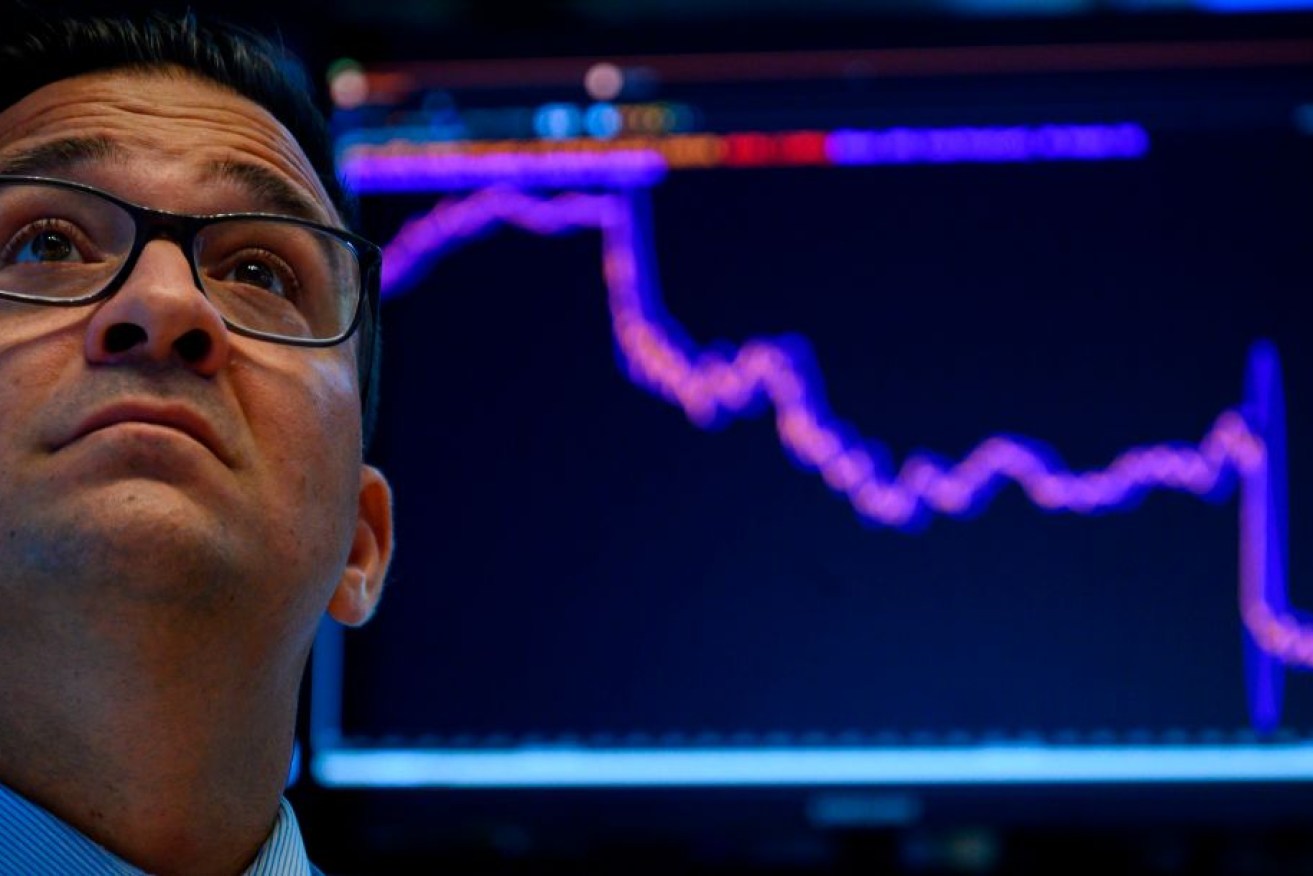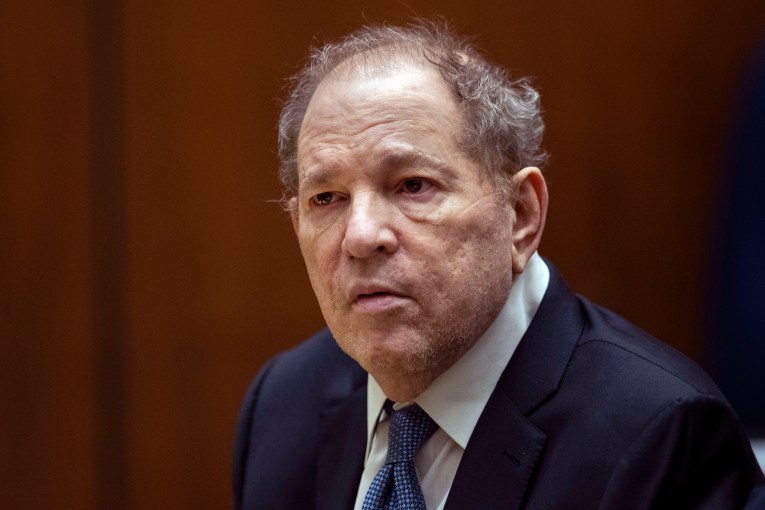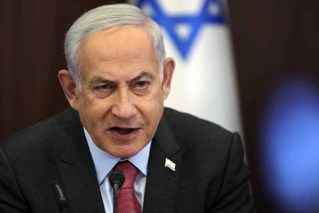What trade war? Trump declares money is ‘pouring’ into USA


Donald Trump has shrugged off the effects of a US trade war with China, despite the knock-on effect to financial markets. Photo: Getty
Donald Trump has talked down the effects of his country’s trade war with China, claiming money is “pouring” into the USA at the same time as financial markets took a tumble.
The American president’s upbeat outlook follows the Australian dollar hitting a ten-year-low on Tuesday and Wall Street notching its worst day of 2019 on Monday.
Former Australian treasurer Peter Costello has warned the protracted trade dispute between the world’s two biggest economies could hurt retirees’ savings and create uncertainty.
Mr Costello told The Australian that superannuation funds had lost money, meaning “Australian retirees have lost money”.
However Mr Trump has dismissed global concerns over the escalating crisis, proclaiming on Twitter that his country was going strong.
“Massive amounts of money from China and other parts of the world is pouring into the United States for reasons of safety, investment, and interest rates!” Mr Trump tweeted on Tuesday.
“We are in a very strong position.”
Massive amounts of money from China and other parts of the world is pouring into the United States for reasons of safety, investment, and interest rates! We are in a very strong position. Companies are also coming to the U.S. in big numbers. A beautiful thing to watch!
— Donald J. Trump (@realDonaldTrump) August 6, 2019
US stocks have bounced back more than 1 per cent on Tuesday (US time) after a sharp sell-off the previous day as China stepped in to stabilise the yuan, easing concerns that currencies would be the next weapon in the US-China trade war.
The gains came a day after US stocks’ biggest percentage drop of the year and a sharp fall in the Chinese currency.
Australian Treasurer Josh Frydenberg called for cool heads in the ongoing trade war.
Mr Frydenberg said it was important to be realistic about uncertainty in the global economic outlook.
“We shouldn’t overreact to these developments, but we should recognise that China’s currency moves and the increase in the US tariffs are an unwanted escalation,” he told ABC radio’s AM program on Wednesday.
“These are concerning developments and our message is to continue to encourage cool heads to prevail and for differences between China and the US to be negotiated between the parties.”
He said the federal government would continue to act domestically to stimulate economic growth, pointing to personal income tax cuts which passed parliament last month.
“Right now the Australian government would like to see cool heads prevail,” he said.
Mr Frydenberg downplayed risks to Australians’ retirement savings after former treasurer Peter Costello warned superannuation and the budget’s bottom line could be hit by uncertainty in the global economy.
“People who have had super and money in managed funds have done much better than if they had money in the bank,” he said.
“We’ll still deliver a surplus next year and we’re absolutely determined to do that.”
Mr Trump’s decision last week to slap another 10 per cent tariff on a further $US300 billion ($443 billion) in Chinese imports (adding to a 25 per cent tariff previously imposed on $US250 billion on Chinese imports) triggered the latest tit-for-tat.
The president pledged to stand with American farmers in the face of China’s retaliatory decision to stop buying US agricultural goods and potentially impose its own tariffs on US farm products.
Ratcheting up the pressure on China, the US Treasury Department this week accused China of manipulating its currency by allowing the yuan to fall below the key seven-per-US dollar level for the first time in more than a decade – which would make Chinese exports cheaper.
However China responded strongly, saying it deeply regretted being called a “currency manipulator” and warned that the accusation would lead to chaos in financial markets.
The People’s Bank of China rebutted that it “has not used and will not use the exchange rate as a tool to deal with trade disputes”.
“China advised the United States to rein in its horse before the precipice, and be aware of its errors, and turn back from the wrong path,” it said.
China’s central bank said on Tuesday that Washington’s currency move would “severely damage international financial order and cause chaos in financial markets” while preventing a global economic recovery.
The Trump administration wants to continue trade talks with China and is still planning to host a Chinese delegation for further talks in September.

US and Chinese negotiators have agreed to meet again in the United States in September after holding “frank” and “constructive” talks in Shanghai on July 31. Photo: Getty
Larry Kudlow, director of the White House National Economic Council, told CNBC movement toward an agreement could change the outlook for US tariffs, adding, “It takes two to tango.”
He added that the US economy was still in good shape and said he saw no signs of a global recession on the horizon despite growing concerns the US-China stand-off is slowing manufacturing activity around the world.
“The US economy is very strong. The rest of the world is not. We’re the engine that makes it go. Frankly, I see no signs,” he said, when asked about the prospect of a global recession. “The economic burden is falling vastly more on them (China) than us.”
Mr Kudlow said Washington was forced to take the currency move given a 10 per cent drop in China’s currency since April 2018, and said other members of the Group of Seven industrialised countries supported the action.
“At some point in time, if they are violating our laws, WTO (World Trade Organisation) laws and, frankly, G20 laws of currency stability … we have to take the action,” he said. “They brought it on themselves.”
The US currency action now has driven an even bigger wedge between the two countries.
Global Times, a Chinese tabloid published by the ruling Communist Party’s People’s Daily, said the US had taken the action purely out of a political motive to “vent its anger”.
China “no longer expects goodwill from the United States”, Hu Xijin, the newspaper’s editor-in-chief, tweeted on Tuesday.
In a further sign of deteriorating ties, China’s commerce ministry announced overnight that its companies had stopped buying US agricultural products in retaliation against Washington’s latest tariff threat.
-with AAP








